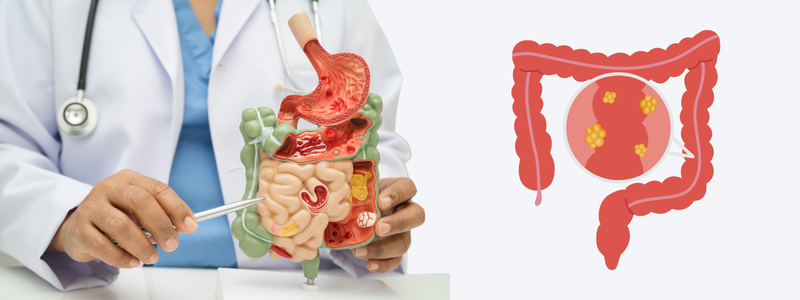
Diseases of the Small and Large Intestine
The small and large intestines are vital parts of the digestive system, responsible for nutrient absorption, water balance, and waste elimination. Disorders affecting these organs can lead to a wide range of symptoms, from mild discomfort to severe health complications. We offer specialized care for a variety of intestinal diseases with a focus on accurate diagnosis, symptom control, and long-term management.
Diarrhea may result from infections, food intolerances, or chronic conditions like irritable bowel syndrome. Acute diarrhea is usually short-lived, while chronic diarrhea can persist for weeks or months. We conduct detailed evaluations to determine the cause and provide targeted treatments to restore digestive balance.
SIBO occurs when excess bacteria grow in the small intestine, interfering with normal digestion and absorption. It can cause bloating, gas, diarrhea, and nutritional deficiencies. Diagnosis is typically confirmed through breath testing, and treatment involves antibiotics, dietary changes, and management of underlying causes.
This is an infection of the intestine caused by viruses, bacteria, or parasites, leading to sudden-onset diarrhea, vomiting, abdominal cramps, and fever. Most cases are self-limiting, but severe or persistent symptoms may require medical attention. We provide supportive care and treatment to prevent complications, especially in vulnerable individuals.
Crohn's disease is a chronic inflammatory condition that can affect any part of the gastrointestinal tract, especially the small intestine. It can cause abdominal pain, diarrhea, weight loss, and fatigue. Management includes medication, nutritional support, and in some cases, surgery to control symptoms and reduce inflammation.
Ulcerative colitis is a chronic inflammatory disease that affects the colon and rectum. It causes symptoms such as bloody diarrhea, abdominal pain, and urgency to pass stool. Treatment aims to reduce inflammation, maintain remission, and improve quality of life using medications, dietary adjustments, and occasionally surgery.
Obstructions and strictures occur when the intestine becomes blocked or narrowed, leading to symptoms like abdominal pain, vomiting, and inability to pass stool. Causes include inflammation, scar tissue, tumors, or hernias. Treatment may involve medications, endoscopic procedures, or surgery depending on severity.
Constipation is a common condition characterized by infrequent or difficult bowel movements. It can result from dietary factors, medications, or underlying medical conditions. We offer a range of treatment options including lifestyle advice, medications, and evaluation for more serious causes if symptoms persist.
Colon cancer often develops silently and may only present symptoms in later stages, such as bleeding, changes in bowel habits, or weight loss. Early detection through screening is key. We provide diagnostic services, surgical interventions, chemotherapy, and long-term follow-up for patients with colon cancer.
Polyps are abnormal growths in the lining of the colon that can potentially turn cancerous over time. They are often found during routine colonoscopy and can usually be removed during the procedure. Regular screening is important for early detection and prevention of colon cancer.
This condition involves small bulging pouches (diverticula) that form in the colon wall. While often asymptomatic, they can become inflamed or infected, leading to diverticulitis. Symptoms include abdominal pain, fever, and changes in bowel habits. Treatment includes dietary changes, antibiotics, and sometimes surgery.
Hemorrhoids are swollen veins in the anal or rectal area that can cause pain, bleeding, and itching. They may result from constipation, straining, or prolonged sitting. We offer a range of treatments from lifestyle modifications to minimally invasive procedures and surgical options when necessary.
Bleeding from the lower gastrointestinal tract can be caused by hemorrhoids, diverticular disease, cancers, or inflammatory conditions. It may present as blood in the stool or rectal bleeding. Prompt evaluation and treatment are essential to identify the source and prevent further blood loss.
Anorectal conditions include fissures, abscesses, fistulas, and infections that affect the anus and rectum. These can cause pain, bleeding, or discharge. We provide complete evaluation and both medical and surgical treatment to relieve symptoms and ensure long-term healing.
